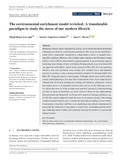The environmental enrichment model revisited: A translatable paradigm to study the stress of our modern lifestyle
artículo original

Ver/
Fecha
2021-02-27Autor
Rojas Carvajal, Mijail
Sequeira Cordero, Andrey
Brenes Sáenz, Juan Carlos
Metadatos
Mostrar el registro completo del ítemResumen
Mounting evidence shows that physical activity, social interaction and sensorimotor
stimulation provided by environmental enrichment (EE) exert several neurobehavioural
effects traditionally interpreted as enhancements relative to standard housing
(SH) conditions. However, this evidence rather indicates that SH induces many
deficits, which could be ameliorated by exposing animals to an environment vaguely
mimicking some features of their wild habitat. Rearing rodents in social isolation (SI)
can aggravate such deficits, which can be restored by SH or EE. It is not surprising,
therefore, that most preclinical stress models have included severe and unnatural
stressors to produce a stress response prominent enough to be distinguishable from
SH or SI—frequently
used as control groups. Although current stress models induce
a stress-related
phenotype, they may fail to represent the stress of our urban lifestyle
characterized by SI, poor housing and working environments, sedentarism, obesity
and limited access to recreational activities and exercise. In the following review,
we discuss the stress of living in urban areas and how exposures to and performing
activities in green environments are stress relievers. Based on the commonalities
between human and animal EE, we discuss how models of housing conditions (e.g.,
SI–SH–
EE)
could be adapted to study the stress of our modern lifestyle. The housing
conditions model might be easy to implement and replicate leading to more translational
results. It may also contribute to accomplishing some ethical commitments by
promoting the refinement of procedures to model stress, diminishing animal suffering,
enhancing animal welfare and eventually reducing the number of experimental
animals needed.
External link to the item
10.1111/ejn.15160Colecciones
- Biología [1644]

